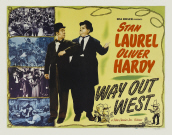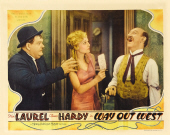
 Laurel & Hardy come to Brushwood Gulch in the Wild West to deliver
the deed to a gold mine to the daughter of a recently deceased
partner of theirs. Their enquiries of saloon owner
James Finlayson prompt him to palm off his brassy partner as the
heiress, and taken in by her, they hand over the deed. Later
they encounter the genuine heiress, employed as a kitchen maid in
the saloon, and determine to get the deed back. Their initial
efforts get them run out of town, but a final nocturnal foray into
the saloon crowns their efforts with success.
Laurel & Hardy come to Brushwood Gulch in the Wild West to deliver
the deed to a gold mine to the daughter of a recently deceased
partner of theirs. Their enquiries of saloon owner
James Finlayson prompt him to palm off his brassy partner as the
heiress, and taken in by her, they hand over the deed. Later
they encounter the genuine heiress, employed as a kitchen maid in
the saloon, and determine to get the deed back. Their initial
efforts get them run out of town, but a final nocturnal foray into
the saloon crowns their efforts with success.
With the possible exception of
Sons of the Desert, which was
subtler if not funnier, Way Out West must rank as the best of
all the
Laurel & Hardy features. Not only is it pure,
unadulterated
Laurel & Hardy, with no time
wasted on subsidiary plotting or romantic or musical "relief," but
it is also a first-rate satire of the Western genre. Most such
satires have usually consisted of putting a comic—Jack
Benny,
Bob Hope,
Martin and Lewis,
Abbott & Costello—through
their customary paces against a Western backdrop, which is often not
exploited at all.
The Marx Brothers came closer to genuine satire with their
Go West, and
Laurel & Hardy,
though denied the budget the
Marx Brothers had and thus limited in their spoofing of
spectacular action sequences, succeed perhaps best of all.
Their characters are beautiful takeoffs on the standard wandering
cavaliers, while
James Finlayson, cast as Mickey Finn, outdoes himself as
the epitome of double-dyed villainy, the sheer joy of chicanery
almost outweighing the monetary rewards it will bring.
Finlayson's direct stares at the audience, often done in direct
counterpoint to Hardy's (Hardy would appeal for sympathy, while
Finlayson's stares were aggressive, as if
daring the audience to do anything with its knowledge of his own
perfidy) here are extended and exploited as never before. As
he outlines some particularly heinous piece of villainy, he
rubs his hands, chuckles, leaps for joy and looks to the audience
for admiration of his cunning; or as he tells some exceptionally
outrageous lie, he stares at the camera with an exaggerated intake
of breath, over-awed himself by his own skullduggery.
There isn't a wasted moment in Way Out West. Even when
the plot isn't being propelled forward, there are delightful little
vignettes and the establishment of running gags. Early in the
film,
Laurel & Hardy,
accompanied by their mule, wade through a river. Hardy's
aplomb, and the position of the camera, tip us off to what is
coming-and, sure enough, he steps into a hidden pot-hole, and
plunges beneath the surface of the water. Familiarity was too
much an essential part of the
Laurel & Hardy
format for it ever to breed contempt, and thus the gag works even
better when it is repeated at the end of the film as a wrap-up, this
time with the comedians walking away from the camera instead of
towards it.
An
amusing, but admittedly rather protracted, early sequence in which
they are confused by a signpost which the wind keeps shifting into
different directions was never included in the U.S. release version,
but was retained in the European prints. (Laurel
& Hardy
films, extremely popular in Britain and Europe, invariably played at
the top of the bill, where the short running times were sometimes a
handicap).
Hitchhiking a stagecoach ride into town, Hardy engages the lone lady
in the coach in some marvelous small-talk. "A lot of weather
we've been having lately," he begins coyly, and adds asininity to
absurdity, the convivial gallant and the intruding bore all rolled
into one, while his captive audience smiles politely, hoping he'll
shut up. Hardy of course is merely seeking to bring a little
old-world grace and charm to this wilderness, and he is rudely taken
aback when they reach their destination. The lady is met by
her husband, the burly sheriff, who asks if she had a nice journey.
Yes, she tells him, except for that awful man who bothered her from
the moment he got into the coach. The sheriff gives the boys
until the next coach to get out of town. With the plot proper
not yet under way,
Laurel & Hardy
still find time to dally outside the saloon, and go into an
extemporaneous and charmingly executed soft-shoe shuffle. It
is performed in one long take, like a vaudeville routine, with an
audaciously obvious back projection screen (cowboys, horses, wagons
going about their business in the dusty street) immediately behind
them. An unexpected bonus later in the film is a second such
musical interlude when, as punctuation between two comedy episodes,
the boys relax in the saloon and sing "In The Blue Ridge Mountains
of Virginia," performed simply and pleasingly, easing into comedy
only for its climax, when Laurel is hit on the head and switches
from a shrill falsetto to a deep base.

 The first encounter with the bogus heiress provides some superb
comedy.
Laurel & Hardy,
too trusting and good-natured to see through the sham sweetness and
phony tears of the gold-digging impostor, are entirely taken in by
her. Hardy has cautioned Stanley to break the sad news gently, but
Stanley, unfamiliar with the ways of diplomacy, blurts out the news
with a bald statement and seems pleased with his information.
"Is my poor daddy really dead?" croons the bogus heiress tearfully,
and Stan solaces her with, "I hope so-they buried him!" With
dignity, Hardy rescues the delicate situation and hands over the
deed to the mine. A family locket has to be handed over too,
but this somehow has slipped into his shirt. Stan's efforts to
help Ollie find it soon cause the pair to be hopelessly enmeshed in
a tangle of shirts, buttons, and suspenders, while Hardy, by now in
a state of unseemly dishabille, murmurs his apologies to the
presumably genteel young lady, who is doing her best to express
polite shock, while Finlayson's face can express nothing more than
ill-concealed impatience. Their mission finally completed,
however, the boys leave, only to run smack into the genuine heiress.
The first encounter with the bogus heiress provides some superb
comedy.
Laurel & Hardy,
too trusting and good-natured to see through the sham sweetness and
phony tears of the gold-digging impostor, are entirely taken in by
her. Hardy has cautioned Stanley to break the sad news gently, but
Stanley, unfamiliar with the ways of diplomacy, blurts out the news
with a bald statement and seems pleased with his information.
"Is my poor daddy really dead?" croons the bogus heiress tearfully,
and Stan solaces her with, "I hope so-they buried him!" With
dignity, Hardy rescues the delicate situation and hands over the
deed to the mine. A family locket has to be handed over too,
but this somehow has slipped into his shirt. Stan's efforts to
help Ollie find it soon cause the pair to be hopelessly enmeshed in
a tangle of shirts, buttons, and suspenders, while Hardy, by now in
a state of unseemly dishabille, murmurs his apologies to the
presumably genteel young lady, who is doing her best to express
polite shock, while Finlayson's face can express nothing more than
ill-concealed impatience. Their mission finally completed,
however, the boys leave, only to run smack into the genuine heiress.
Now in possession of all the facts, they rush back to Finlayson's
room and indignantly demand the return of the deed. Finlayson
and his crony, now revealed in their true colors, refuse and a wild
free-for-all develops, with the deed being passed from hand to hand,
and thrown across the room, like a football. For a time, the
deed is safely in Laurel's possession, but the scheming saloon girl,
in a reversal of cliched seduction scenes, chases Laurel into her
bedroom, locks the door behind her, and throws herself on Laurel,
who is cowering timidly on the bed. With the camera recording
the titanic struggle from above, side and from under the bed, Laurel
is finally defeated when the vamp resorts to tickling as a last
measure, and immediately reduces him to a state of screaming
hysterics. One of his funniest variations on their old
laughing routine, it is one of the highlights of the picture.
Rendered quite helpless by this onslaught, he is of no further use
to Hardy—thereafter the girl has only to approach him and he
collapses in hysterics again—and the deed, recovered by the
villains, is locked away in their safe.
Another brief period of repose provides the opportunity to develop
some of the running gags a little further. One of the best
involves Laurel's ability to snap his fingers and turn his thumb
into a flaming torch with which he lights his pipe. Hardy,
despite strenuous efforts, is unable to duplicate the feat, and
finally gives it up as not being worth the bother. Of course,
he achieves success when he least expects it a casual flick of his
fingers later in the film (during a nocturnal foray after the deed)
turns his thumb into a veritable flaming beacon!
The longest single slapstick sequence is retained for the climax,
when Stan and Ollie break into Finlayson's saloon at night.
First comes the problem of climbing into the upstairs window, a
problem solved—apparently—by a pulley system and a mule. As
Hardy sails majestically upwards, Laurel tells him, "Wait a minute,
I want to spit on my hands!" There is a moment's horrified
realization for Ollie before he plummets downwards. Despite
their attempts to be secretive, the howls of pain and ear-shattering
sounds of collapse, collision, and destruction attendant on any
Laurel & Hardy
burglary venture, naturally arouse the nightshirted Finlayson from
his slumbers. Racing up a ladder, Hardy is caught when the
flap of a trapdoor falls squarely on, and over, his head, encircling
it like a millstone. The door is jammed, and there is Hardy's
head, emerging through the floorboards. Laurel grabs the head
between both hands and yanks—and an elasticized replica of Hardy's
head and neck is stretched some three or four feet before
boomeranging back to its original position with a resounding thud.
Finlayson's footsteps are getting nearer, so Stan hides Ollie's head
under a convenient tin pail and scampers away to conceal himself.
Finlayson leaps into the attic with a triumphant bound and surveys
the scene with wide eyes and wrinkled-up nose. As he crosses
the room, .he trips over the awkwardly placed pail. Annoyed,
he aims a furious full-bodied kick at the offending implement.
Thanks to Hardy's ample head being wedged inside, the pail refuses
to budge, and Finlayson hobbles off, nursing his injured foot, while
Laurel tomes out of hiding to ease the pail off his pal's somewhat
battered head.
The final confrontation takes place when the boys take refuge inside
a piano, the tinkling notes tipping off Finlayson that something is
amiss. Stealthily looking inside the piano, he spots his prey,
and nods a confirmation of his discovery to the audience. Then
he sits down and plays a lively jig, each dull thud on the keyboard
telling him that he has hit home. Finally, the piano collapses
in a jangling mass of wires and splintered wood, and the chase is on
again, winding up with Finlayson first hoisted up to a chandelier
and tied there by his nightshirt, and finally trapped in the steel
shutters surrounding his saloon.
Way Out West is 100-proof
undiluted
Laurel & Hardy, and one of their best showcase vehicles.
Even though it inevitably has certain echoes of previous films, it
has no actual repetition of specific earlier gags, and is so crammed
with incident that there is no time for those slowly-developed
milkings of single gags which so often alienated non-partisans of
Laurel & Hardy. Understandably, it was one of their best liked
features.
